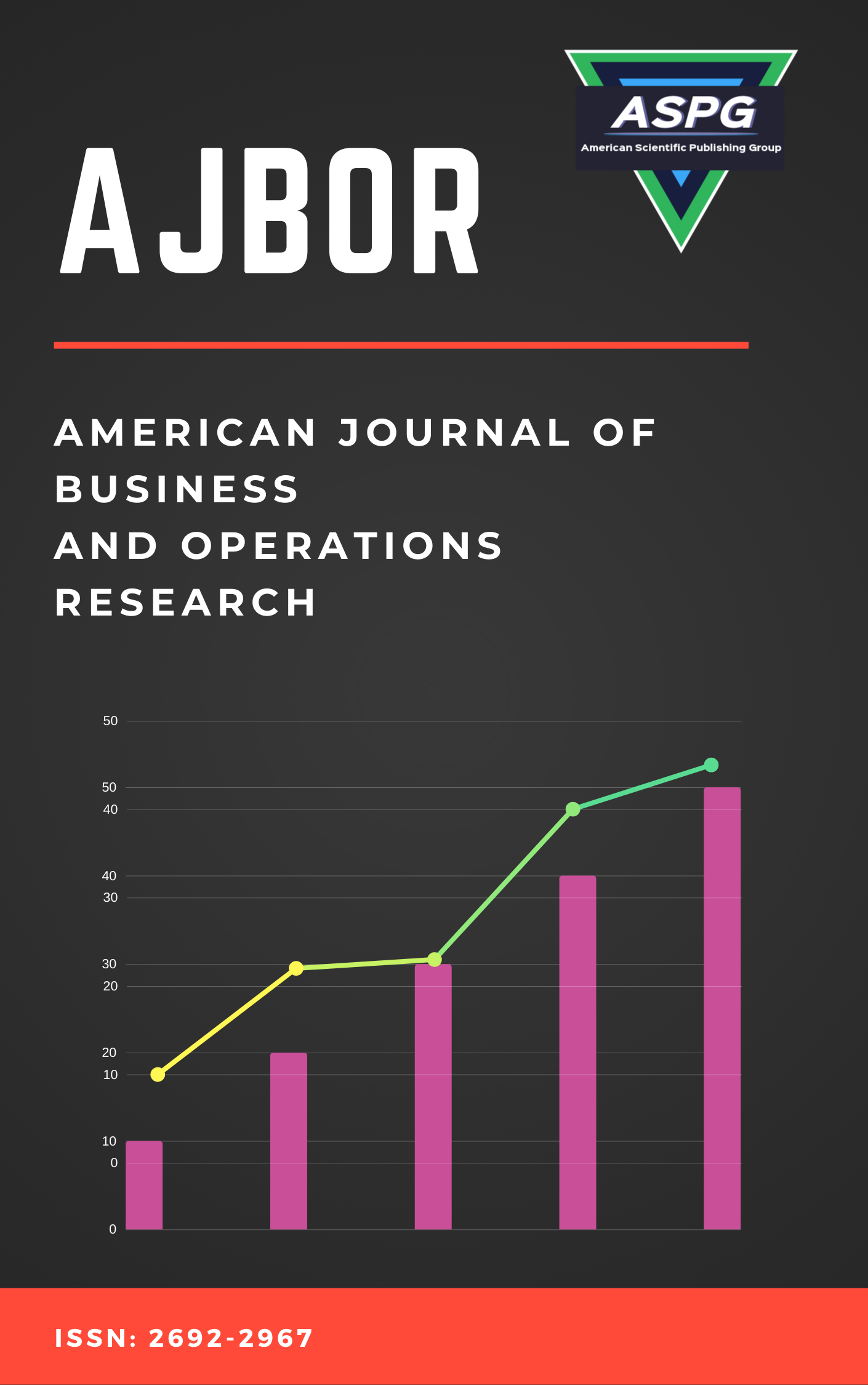

Volume 11 , Issue 1 , PP: 62-68, 2024 | Cite this article as | XML | Html | PDF | Full Length Article
Ilknur Ozturk 1 * , Festus Victor Bekun 2
Doi: https://doi.org/10.54216/AJBOR.110107
Based on the business context, resilience and sustainability seem to have multiple dimensions and connections. Administrative sustainability strategies can help a company develop and become more resilient. With the use of a sustainability maturation index (SMI), this study attempts to analyze how the financial success of a business is affected by its approach to sustainable development. As resilience abilities are closely linked to the SMI, this study proposes to explore the initial integration of both sustainable development and resilience criteria into a single framework. To determine whether there could be an interaction between the SMI and economic performance indices, planned conversations were used to gather data from 35 different firms. The investigation disproves widely circulated claims, demonstrating that there is no meaningful correlation between profitability and sustained business operations. It's noteworthy to point out that market emphasis, organizational size, and firm place of origin do not significantly correlate with SMI. One could argue that to evaluate the effects of environmentally friendly procedures, a company's multi-dimensional performance, which includes both financial and non-financial measurements, should be considered. In addition, more research is required to identify the nonfinancial metrics of success that businesses use to measure resilience and sustainable development to create a cohesive framework that facilitates trade-off evaluation.
Sustainability , Business Intelligence , Business Management , Data Analytics , E-commerce.
[1] Kim, A., Yang, Y., Lessmann, S., Ma, T., Sung, M. C., & Johnson, J. E. (2020). Can deep learning predict risky retail investors? A case study in financial risk behavior forecasting. European Journal of Operational Research, 283(1), 217-234.
[2] Bahrami, M., & Shokouhyar, S. (2022). The role of big data analytics capabilities in bolstering supply chain resilience and firm performance: a dynamic capability view. Information Technology & People, 35(5), 1621-1651.
[3] Phan, D. T., & Trang Tran, L. Q. (2022). Building a Conceptual Framework for Using Big Data Analytics in the Banking Sector.
[4] Zhu, X., & Yang, Y. (2021). Big data analytics for improving financial performance and sustainability. Journal of Systems Science and Information, 9(2), 175-191.
[5] Rasmussen, J. (1997). Risk management in a dynamic society: a modelling problem. Safety science, 27(2-3), 183-213.
[6] Clintworth, M., Lyridis, D., & Boulougouris, E. (2021). Financial risk assessment in shipping: a holistic machine learning based methodology. Maritime Economics & Logistics, 1-32.
[7] Dicuonzo, G., Galeone, G., Zappimbulso, E., & Dell'Atti, V. (2019). Risk management 4.0: The role of big data analytics in the bank sector. International Journal of Economics and Financial Issues, 9(6), 40-47.
[8] Shih, D. H., Hsu, H. L., & Shih, P. Y. (2019, April). A study of early warning system in volume burst risk assessment of stock with Big Data platform. In 2019 IEEE 4th international conference on cloud computing and big data analysis (ICCCBDA) (pp. 244-248). IEEE.
[9] Haile, I. M. (2020). Data Analytics in Financial Institutions: How Text Analytics Can Help in Risk Management (Doctoral dissertation, Colorado Technical University).
[10] Kothandapani, H. P. (2023). Applications of Robotic Process Automation in Quantitative Risk Assessment in Financial Institutions. International Journal of Business Intelligence and Big Data Analytics, 6(1), 40-52.
[11] Xiaoli, W., & Nong, N. B. (2021). Evaluating Big Data Strategies for Risk Management in Financial Institutions. Journal of Computational Social Dynamics, 6(3), 34-45.
[12] Lam, J. (2014). Enterprise risk management: from incentives to controls. John Wiley & Sons.
[13] Andriosopoulos, D., Doumpos, M., Pardalos, P. M., & Zopounidis, C. (2019). Computational approaches and data analytics in financial services: A literature review. Journal of the Operational Research Society, 70(10), 1581-1599.
[14] Lemieux, V. L. (2012). Records and information management for financial analysis and risk management: An introduction. In Financial analysis and risk management: Data governance, analytics and life cycle management (pp. 1-13). Berlin, Heidelberg: Springer Berlin Heidelberg.
[15] Rodriguez, L., & Da Cunha, C. (2018). Impacts of big data analytics and absorptive capacity on sustainable supply chain innovation: A conceptual framework. LogForum, 14(2), 151-161.
[16] Mashrur, A., Luo, W., Zaidi, N. A., & Robles-Kelly, A. (2020). Machine learning for financial risk management: a survey. IEEE Access, 8, 203203-203223.
[17] Saeed, T. (2020). The Application of Data Mining Techniques for Financial Risk Management: A classification framework. IJCSNS, 20(8), 84.
[18] Samuel, J. (2017). Information token driven machine learning for electronic markets: Performance effects in behavioral financial big data analytics. JISTEM-Journal of Information Systems and Technology Management, 14, 371-383.
[19] Chakraborty, G. (2020). Evolving profiles of financial risk management in the era of digitization: The tomorrow that began in the past. Journal of Public Affairs, 20(2), e2034.
[20] de Conti, B., Gisin, V., & Yarygina, I. (2021). Dynamic Fractal Asset Pricing Model for Financial Risk Evaluation. In Risk Assessment and Financial Regulation in Emerging Markets' Banking: Trends and Prospects (pp. 355-367). Cham: Springer International Publishing.